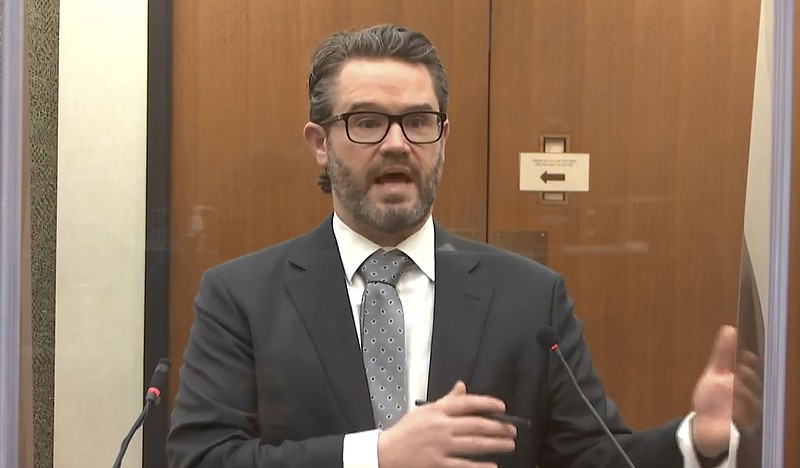MINNEAPOLIS -- Former officer Derek Chauvin was justified in pinning George Floyd to the ground because he kept struggling, a use-of-force expert testified for the defense Tuesday, contradicting authorities from both inside and outside the Minneapolis Police Department.
[Video not showing up above? Click here to watch » https://www.youtube.com/watch?v=GSm8davH_sg]
Taking the stand at Chauvin's murder trial, Barry Brodd, a former Santa Rosa, Calif., officer, defended Chauvin's actions. At one point, the prosecutor reacted mockingly when Brodd said that Floyd kept moving instead of "resting comfortably" on the pavement.
"It's easy to sit and judge ... an officer's conduct," Brodd testified.
He said he doesn't believe Chauvin and the other officers used deadly force when they held Floyd down on his stomach, his hands cuffed behind his back and Chauvin's knee on his neck area for what prosecutors say was 9½ minutes.
Brodd likened it instead to a situation in which officers use a stun gun on someone fighting with officers, and the suspect falls, hits his head and dies: "That isn't an incident of deadly force. That's an incident of an accidental death."
Several top Minneapolis police officials, including the police chief, have testified that Chauvin used excessive force and violated his training. And medical experts called by prosecutors have said that Floyd died from a lack of oxygen because of the way he was restrained.
But Brodd said: "I felt that officer Chauvin's interactions with Mr. Floyd were following his training, following current practices in policing and were objectively reasonable."
Police officers are allowed certain latitude to use deadly force when someone puts the officer or other people in danger. Legal experts say a key issue for the jury will be whether Chauvin's actions were reasonable in those specific circumstances.
Prosecutor Steve Schleicher used his cross-examination to once again go through video clips of a pinned-down Floyd saying he couldn't breathe and then going limp.
The prosecutor said that a reasonable officer in Chauvin's position would have known Floyd stopped resisting, that another officer told him he couldn't find a pulse, and that others said Floyd had passed out and was no longer breathing.
Chauvin, a 45-year-old white man, is on trial on charges of murder and manslaughter in Floyd's death last May after his arrest after a counterfeit $20 was used at a neighborhood market.
Chauvin attorney Eric Nelson has argued that the 19-year Minneapolis police veteran did what he was trained to do and that Floyd died because of his illegal drug use and underlying health problems.
The defense began presenting its case Tuesday after the prosecution rested after 11 days of testimony and video evidence.
Nelson started by bringing up a 2019 arrest in which Floyd suffered from dangerously high blood pressure and confessed to heavy use of opioids. And he suggested that the 46-year-old Black man may have suffered last May from "excited delirium" -- what a witness described as a potentially lethal state of agitation and even superhuman strength that can be triggered by drugs, heart disease or mental problems.
Nicole Mackenzie, a Minneapolis police training officer, was called by Nelson to expound on excited delirium.
Mackenzie testified that the signs of excited delirium can include incoherent speech, extraordinary strength and sweating, and that officers are trained to call paramedics, because a person in that state can rapidly go into cardiac arrest.
Information for this article was contributed by Angie Wang of The Associated Press.









